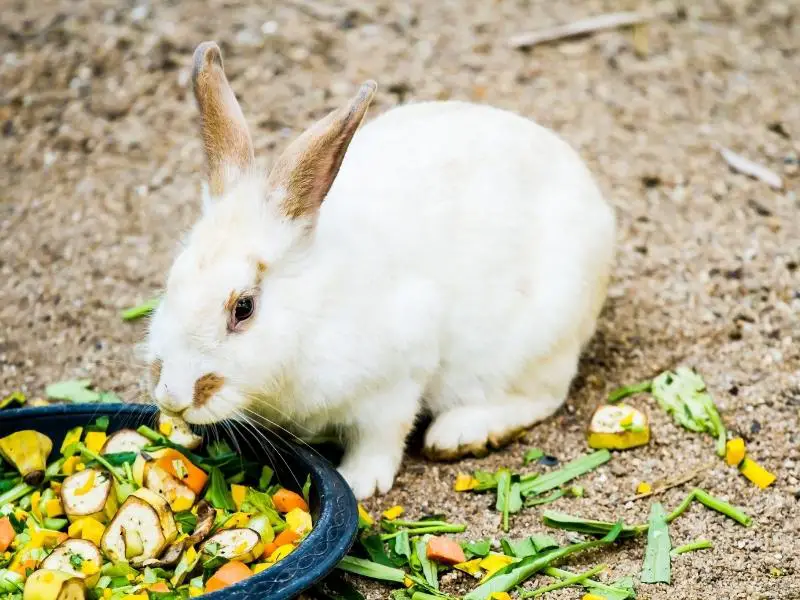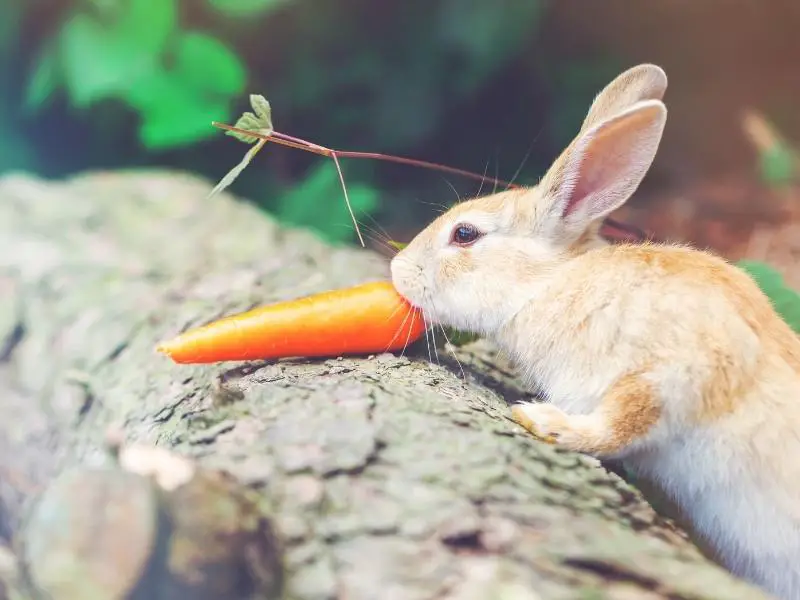Watching your bun sit upright on its hind legs and gobble down basil is just the cutest. The second they pick up the scent, they are at the hutch door waiting for more. Have you ever wondered if you might be overfeeding your bun or if they aren’t getting enough food? Same.
So how much do rabbits eat?
Rabbits are plant eaters (herbivores) and eat hay continuously (they are grazers). A rabbit’s digestive system processes and digests food quickly. Depending on the size of the rabbit, they eat 1 to 3 cups of leafy greens and ¼ to ½ cups of pellets daily. Treats are given in small amounts.
This guide will give you all the information you’ll need on how much rabbits eat and how much to budget for rabbit food.
Do Rabbits Eat All Day?
Your bun is a herbivore (they eat plants), and its digestive system is designed for grazing. They continuously nibble on pellets, grass, and hay throughout the day (similar to cows and horses).
Rabbits are monogastric (have one stomach), and their stomachs are the largest in relation to the size of their body than any of the other monogastric animals.
Let’s take a look at some other monogastric animals:
- Horses
- Cats
- Ferrets
- Mice
- Hamsters
- Dogs
- Rats
- Guinea pigs
If your bun stops eating for a whole day, this can indicate that they’re ill, and you should seek veterinary advice urgently. Rabbits need a constant source of grass or hay, which is a good source of fiber, for their digestive system to function correctly.
How Much Should Rabbits Eat Per Day?
Your floppy-eared friend should have access to an unlimited amount of hay daily. This helps with their digestion and chewing on the grass files their teeth down.
Let’s take a look at how much rabbits should eat per day:
- Rabbits with a body weight of around 2 pounds (such as the Netherland Dwarf) should have 1 cup of fresh leafy greens and 2 tablespoons of pellets per day.
- Rabbits with a body weight of around 8 pounds (such as the German Angora) should have 4 cups of fresh leafy greens and ½ cup of pellets per day.
- Rabbits with body weight over 10 pounds (such as the Flemish Giant rabbits) should have 5 cups of fresh leafy greens and ½ cup of pellets per day.
As mentioned, rabbits nibble and graze continuously, which means they can over-eat. If your bun eats more than the recommended food, it can become obese or develop diabetes.
How Many Meals Should a Rabbit Eat?
Rabbits should have an unlimited supply of hay to graze on throughout the day. You can supplement your bun’s diet twice a day with various fresh leafy greens, vegetables, and good-quality pellets.
Rabbits have a sweet tooth, and they enjoy getting treats. This should be limited (especially if you are giving your bun commercial treats) as they contain high sugar levels. Treats can be given 2 or 3 times a week in small amounts.
Depending on the type of food you give your bun, their food will cost around $40 per month ($480 per year). As a guideline, your buns meals should consist of:
- 80% of Timothy grass hay
- 10% of leafy green vegetables and fruit
- 5% of pellets
- 0-5% of treats
Unfortunately, a rabbit’s digestive system is fragile and digestive illnesses are common. Don’t give your bun too many leafy greens or snacks as this can lead to diarrhea, gas, and bloating, which is uncomfortable for your bun and can be fatal if left untreated.
What Is a Well-Balanced Diet for a Rabbit?

Here’s a closer look at a well-balanced diet for your floppy-eared friend:
Unlimited Hay
Good quality grass hay is essential for regulating your bun’s digestive system. Hay should make up about 80% of a rabbit’s diet. The fiber and protein content will ensure that the gut flora is well-balanced. Make sure the hay is fresh, as hay that has mold or dust can make your rabbit ill.
Rabbits under a year can have Alfalfa hay, but this should not be fed to adult rabbits (unless your vet recommends it because your bun is sick). Alfalfa hay is a legume and is very rich. It can instead be offered as a treat once in a while.
Here’s a list of hay that’s good for adult rabbits:
- Timothy grass hay
- Orchard grass hay
- Brome hay
- Oat hay
- Marsh
- Ryegrass
Fresh Leafy Greens and Herbs
Fresh leafy greens should make up 10% of your bun’s daily diet. Breaking down the cellulose in the leafy greens does wonder for your buns’ digestive tract and keeps the intestinal tract working properly.
Here are a few leafy greens and herbs to add to your bun’s diet:
- Bok Choy
- Basil
- Dandelion greens
- Dill
- Carrots
Pellets
Pellets should only make up about 5% of your bun’s diet. Some bunny owners don’t give their rabbits pellets; however, it is a good way to provide your bun with additional nutrients.
Once your bun has eaten its daily portion of pellets, it’s not necessary to refill its bowl. Your bun should then continue to eat the hay.
Fresh Fruit and Treats
Fresh fruit should only be given to your bun once or twice weekly as a treat. The high sugar levels in fruit and commercial treats can lead to obesity or diabetes if they eat fruit daily.
Here are some suggestions of fruits you can give to your bun:
- Blueberries
- Apples
- Grapes
- Melon
- Banana
- Nectarine
Tips on Feeding Your Rabbit
Follow these tips when feeding your rabbit:
1. When introducing new food to your rabbit, make sure to offer small amounts. Monitor your bun so they have no side effects such as diarrhea, gas, or bloating.
2. Ensure the hay, fruit, and vegetables are all fresh with no mold or dust covering them.
3. Try to provide your bun with organic food.
4. Wash the fruit and vegetables to remove any wax residue or pesticides.
5. Ensure your bun has access to fresh water.
6. Keep your bun’s eating area clean and remove any leftover food. This prevents flies and the growth of bacteria.
My Last Bunny Thoughts
Your bun loves food and has a serious sweet tooth. As a bunny parent, you need to ensure that your bun has a healthy balanced diet with a variety of nutritious food.
Constantly monitor your bun for any discomfort or pain when introducing new foods.
If they show any symptoms, rather remove that specific food from their diet, and try something else.
Like humans, rabbits can be picky eaters and may turn their noses up at certain foods. This is part of getting to know your bun’s likes and dislikes.
Related Articles:

